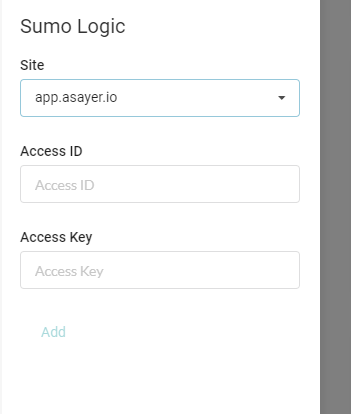SumoLogic
How to integrate SumoLogic with OpenReplay and see backend errors alongside session recordings.
1. Create a new Access ID and Access Key
Section titled 1. Create a new Access ID and Access Key- Login to your SumoLogic account.
- Go to the Access Keys page.
- Click on + Add Access Key.
- In the name put “openreplay” and click on Create Key.
- Copy the new
Access IDandAccess Keyas we need them for our integration. - Click on Done.
For more information about creating an Access ID and Access Key, please refer to this documentation.
2. Enable SumoLogic in OpenReplay
Section titled 2. Enable SumoLogic in OpenReplayPut your Access ID and Access Key in OpenReplay dashboard under ‘Preferences > Integration’.

3. Propagate openReplaySessionToken
Section titled 3. Propagate openReplaySessionTokenTo link a SumoLogic event with the recorded user session, a unique token has to be propagated from your frontend to your backend on each request you want to track. This can be done using a custom HTTP header. In the below example, we use the fetch function to send that header.
const headers = {
Accept: 'application/json',
'Content-Type': 'application/json',
};
if (tracker.getSessionToken()) { // or window.OpenReplay instead of tracker if you're using the snippet
headers['X-OpenReplay-SessionToken'] = tracker.getSessionToken(); // Inject openReplaySessionToken
}
fetch('www.your-backend.com', {
'GET',
headers,
});In order for OpenReplay to associate a SumoLogic message with the recorded user session, a unique token has to be propagated as part of each backend error you wish to track.
Below is an example in Python using Monkey Patching.
import sys
import traceback
#...
old_tb = traceback.print_exception
old_f = sys.stdout
old_e = sys.stderr
OPENREPLAY_SESSION_TOKEN = None
class F:
def write(self, x):
if OPENREPLAY_SESSION_TOKEN is not None and x != '\n':
old_f.write(f"[openReplaySessionToken={OPENREPLAY_SESSION_TOKEN}] {x}")
else:
old_f.write(x)
def flush(self):
pass
def tb_print_exception(etype, value, tb, limit=None, file=None, chain=True):
if OPENREPLAY_SESSION_TOKEN is not None:
value = type(value)(f"[openReplaySessionToken={OPENREPLAY_SESSION_TOKEN}] " + str(value))
old_tb(etype, value, tb, limit, file, chain)
traceback.print_exception = tb_print_exception
sys.stderr = F()The name of the tag openReplaySessionToken is case sensitive.
Have questions?
Section titled Have questions?If you encounter any issues, connect to our Slack or check out our Forum and get help from our community.